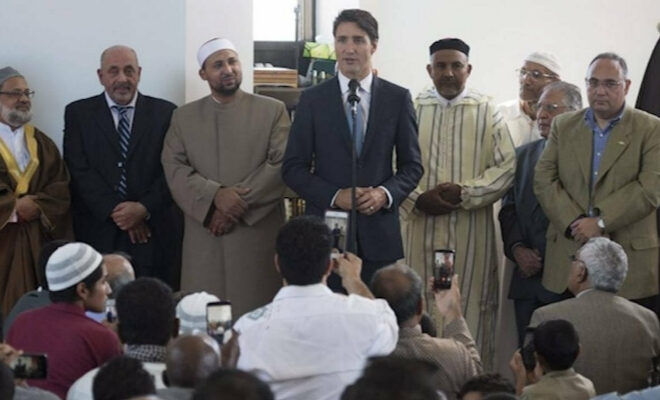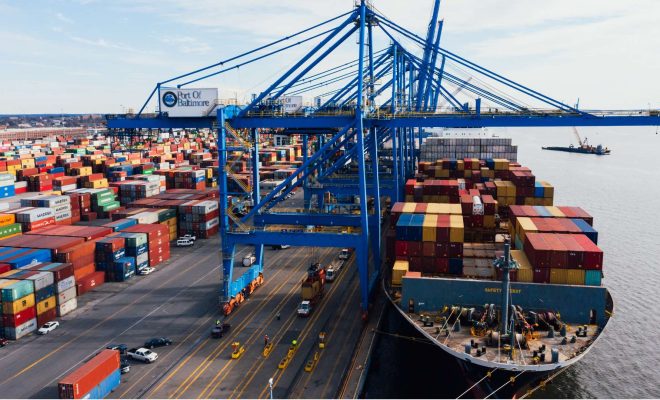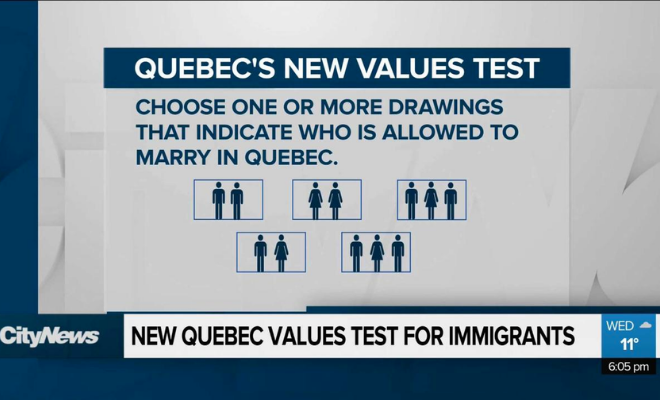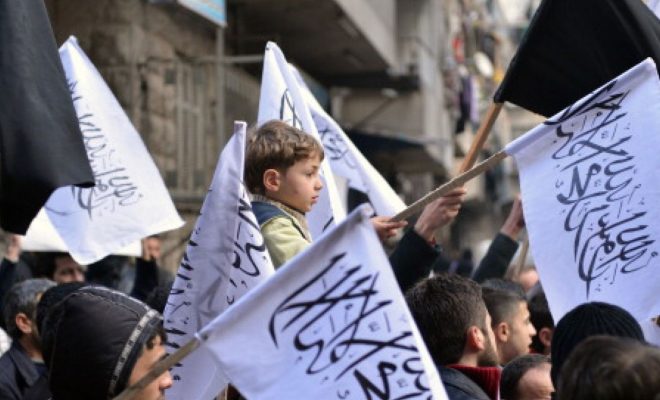Bartering our Aqeedah – A Miserable Bargain!

At the end of June, an Eid Dinner was held in Toronto, inviting 75 elected officials from all levels of the Canadian government, including Prime Minister Justin Trudeau, deputy Conservative leader Lisa Raitt, NDP leader Jagmeet Singh, and Toronto mayor John Tory.
Each speaker stressed the importance of Canadian Muslims to be involved in electoral politics, to defeat bigotry and confront intolerance.
While all leaders indicated an openness to defending the rights of Muslims, and both Trudeau and Singh showed understanding for the brunt of bigotry that Muslims must deal with, the message of the night was underlined by a remark from the Prime Minister, who said:
“I want you to encourage Conservative Muslims to get out and help their local Conservative candidate, to go knock [on] doors, to donate to the Conservative party, to attend a rally for the Conservative leader…I want you to make Muslim volunteers important to the Conservatives…so that never again would any mainstream party in Canada think it’s a good idea to stoke fears and divisions against Muslims or any other group of Canadians,”
This statement, while also serving an underhanded political point-scoring opportunity to Trudeau, summarizes the essential political logic of the dinner itself: that by dedicating our time, energy and political support to the established parties in Canada, we are to make ourselves indispensable to them, and therefore secure our rights. But how effective is this transaction, and what really do we gain from it?
The Cruel Logic of “Political Involvement”
It is no news to the Muslim community in Canada that bigotry is rising in this society, and that visible Muslims are its primary targets. We do not need the Prime Minister to tell us that. The Capitalist system, which has caused stagnated incomes, deteriorated job quality and security, and weakened the social structures of Canadian society at the benefit of the economic elite, has left people disenchanted with the promises of the “Canadian dream”.
Xenophobic politicians are more than happy to scapegoat vulnerable minorities such as Muslims to channel the anger and alienation that most Canadians feel towards this system. Indeed, in the absence of a shared ideological identity and moral culture which people can connect with, the ruling elite has to rely on the shallow bonds of race and tribalism to distract people from the causes of their disenfranchisement.
Trudeau, instead of addressing the roots of this structural oppression, would rather encourage Muslims to make themselves useful to those same opportunistic xenophobes, in the hope that they may hate us less.
Herein is the cruel and twisted logic of integrationist politics: Muslims are told that in order to secure our wellbeing, our only option is to submit ourselves to the political whims of the ruling elite, and their well-entrenched interests. The adage goes, “if you are not at the table, you are on the menu”.
It has to be noted how demeaning and valueless this form of politics is. In contrast to the Islamic position that religious minorities are a sacred trust, that the Creator has commanded us to protect under the contract of dhimma, the Capitalist system is making it clear that our protection is contingent on our usefulness to the ruling elite.
Apart from the cruelty of this demand, it should be clear that catering to the hollow and baseless interests of those in power comes at the significant cost of our personal and collective values as the community that is entrusted with the protection and spread of Islam as a way of life.
The truth is, Islam is always on the menu, regardless of whether we join the table or not.
The Cost of Protection
Integration in this context is not about volunteering at the local hospital or engaging with the genuine needs of our neighbours. It is abandoning the vision and civilizational mission of Islam and diluting our political values in service of secular liberalism.
After all, the established political parties in Canada, as a rule, do not refer to what Allah (swt) has revealed onto our Beloved Messenger (saaw) when making their decisions in how to structure an economy, how to create rules that shape a society, or how to ensure justice. They rely on their own whims and desires, arguing that self interest should be the engine of the economy, personal freedoms should be the basis of our social fabric, and that the rights of property – especially for the wealthy – should trump our concerns for weakening and divisive social structures or a degraded environment. And this is the natural result of being bereft of the guidance provided by the Most Wise and Merciful Creator.
In making ourselves essential to this political class, Muslims would have to abandon our opposition to riba and khamr, upon which the government enriches itself. In volunteering, knocking on doors, or even voting for one of these parties, we would have to ignore the commands of Allah as they relate to sexuality, gender relations, intoxication, business practices. Because it is one thing to accept that in the absence of a righteous Islamic leadership anywhere in the world, we are forced to live in a secular society, but it is another thing altogether to actively expend our time, voice, energy or wealth in support of politicians who rule in violation to Allah’s command. As Allah (swt) tells us:
“…And cooperate in righteousness and piety, but do not cooperate in sin and aggression. And fear Allah; indeed, Allah is severe in penalty.” [TMQ 5:2]
Losing Our Aqeedah
Our reliance on Allah’s Guidance to structure our lives, be it in our personal actions or collective affairs, is not merely a matter of culture or preference. It is part of our aqeedah as Muslims. Allah (swt) informs us:
“But no, by your Lord, they will not [truly] believe until they make you, [O Muhammad], judge concerning that over which they dispute among themselves and then find within themselves no discomfort from what you have judged and submit in [full, willing] submission.”[TMQ 4:65]
And in even starker terms:
“And whoever does not judge by what Allah has revealed – then it is those who are the disbelievers.” [TMQ 5:44]
The judgments and disputes referred to in these ayat are not just matters of individual ibadah but encompass the complete personal and political lives of Muslims. Allah (swt) makes our claim to belief and submission (iman and Islam) conditional to the acceptance of these judgments.
What this means is that our attachment to the personal and political culturing that is contained in Allah’s commands reflects our attachment to Allah. To learn about, holistically understand and convey these commands, is to draw nearer to Him. And to abandon any portion of this culturing, out of fear of controversy or ostracization, is weakening our relationship with the Lord of the Universe.
What could be worth that?
The Reality of Protection
As Muslims, it is part of our core beliefs to understand that protection comes from Allah, and that He alone nourishes and sustains us. As our beloved Messenger tells us:
“Know that if the whole world were to gather together in order to help you, they would not be able to help you except if God had written so. And if the whole world were to gather together in order to harm you, they would not harm you except if God had written so.” [Tirmidhi]
Recognizing this reality allows Muslims to focus on the only relevant mechanism of protection in their lives: their relationship with their Creator. There is no force that can overpower Him, and there is nothing that can protect us from the consequences of disobeying Him.
This does not mean that we are not allowed to take means to protect ourselves. Rather, Muslims are commanded to protect their lives, families and property from harm, as well as defending the weak and oppressed. But the means of this protection must be deemed permissible by Allah (swt).
The Purpose of Integration
It should be obvious that when the Prime Minister of Canada, and 75 other elected officials across all levels of government and political parties have assembled together to deliver a singular coherent message, there is something deeper at work.
They have not assembled out of the goodness of their hearts. They are obviously invested in our acceptance of their call to integration. And it is notable that whatever political differences they may have, they are all united in this message of integration.
This raises the obvious question: whom does integration really serve? Is it, as some Muslim activists will tell us, really for us? Or does it serve the interests of the Capitalist ideology that through a campaign of colonization, criminalization and vilification weakened any system of life that stands in opposition to its hollow and cruel political interests?
The Islamic value system is the only remaining system of life that is actively resisting this global ideology. Integration then is not empowerment, it is terms of surrender.
Instead of Muslims rushing towards secular politicians, would it not be more beneficial for us to work together to convey Islam’s prescriptive solutions to the problems facing Canadians?
Instead of tripping over ourselves in order to show our allegiance to the system, would it not more prudent to demand justice for the many that have been left behind by the established social order from its inception, such as the poor, the indigenous nations, and the racial minorities?
And instead of ingraining ourselves in the secular political culture of the elite, should we not unite as an Ummah to demand the rise of righteous Islamic leadership in the Muslim lands, who – through the complete implementation of Islam – will be a beacon and a voice for the oppressed all over the world?
Setting this as an agenda allows us to engage with society, not through the defeatist terms being imposed upon us by the Capitalist elite, but by the terms given to us by the Lord of the Worlds.
“..God will protect you from them: He is the All Hearing, the All Knowing. And say [believers],‘[Our life] takes its colour from God, and who gives a better colour than God? It is Him we worship.’ Say, [O Muhammad], “Do you argue with us about Allah while He is our Lord and your Lord? For us are our deeds, and for you are your deeds. And we are sincere [in deed and intention] to Him.” [TMQ 2:137-139]









